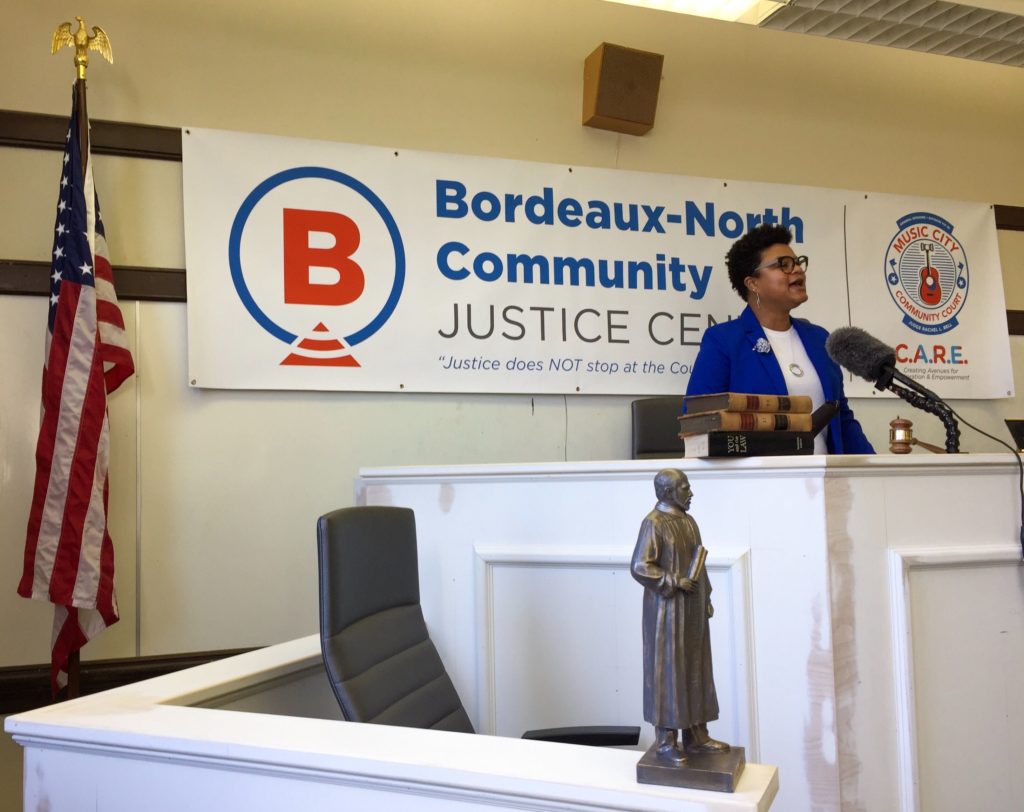
Tennessee’s first community court is bringing a different approach to justice to a neighborhood researchers say has the highest incarceration rate in the country.
The unconventional court has helped already thousands of people navigate the twists and turns of the justice system, since its founding in 2012. Now, it’s expanding to North Nashville.
Judge Rachel Bell likes to say that justice doesn’t stop at the courthouse steps. That’s why she’s bringing the courtroom to the same community center where she used to play basketball as a kid.
“North Nashville has been plighted with a need to have more resources and more understanding of how the criminal justice system can actually help and not hinder their future and their success,” she said at a soft launch last week for the new Bordeaux-North Community Justice Center.
Just like the courthouse downtown, the center will handle both criminal and civil cases. But it will also help people expunge old charges from their records, host resource fairs and have a special diversionary court for 18- to 30-year-olds who commit minor crimes.
The center is an extension of the General Sessions Music City Community Court, which Bell started seven years ago. It’s one of about 40 so-called community courts across the country, which emphasize rehabilitation. Instead of sending low-level offenders to jail by default, judges often opt for alternative sentences, like community service, job training and reconciliation.
“For the individuals, the ones that come into our community court, they’re no longer called defendants,” she said. “They’re then called participants, because we want to show them that we’re here to support them and what they’re doing.”
Research suggests these courts can reduce recidivism, save taxpayers money and send fewer people to jail. Juxtapose that with a striking study released last year by the Brookings Institute. It found kids who grew up in North Nashville’s 37208 zip code in the 1980s were more likely to be locked up than those in any other zip code in the country. Bell wants to change those odds.
“How many zip codes do we have in Nashville, Davidson County? How many zip codes do we have in the state of Tennessee? We’re number one in the United States of America, right here, in this zip code for arrests and incarceration?” Bell asked a roomful of local leaders — including the district attorney, the public defender and various councilmembers. “I mean, can y’all believe that? Can you believe that? We’re right here in the midst of it, and all of us have to do the work.”
Councilmember Kyontzè Toombs — a native of North Nashville — hopes the center will help to clear up stereotypes about her community.
“It’s gonna give people that second chance,” she said. “It’s going to help to show the community at large basically: Don’t believe the hype. Don’t believe that, you know, we’re violent people, that we don’t deserve a second chance, that we’re not human beings. We are human beings, and, given the right resources, we can reach our full potential.”
Toombs was recently assigned to a Metro Council special committee that she says is focused on addressing issues brought to light by the Brookings Institute report without further stigmatizing the community.
“When people hear that 37208 has the highest incarceration rate, it adds to some people’s stereotypes of our community that, ‘Oh, that’s where the crime is. That’s where the violent people are. You don’t want to go to that area,'” she said.
Toombs also wants the committee to highlight the “beautiful people who are working hard every day,” like those behind the new justice center.
Along with Bell and her court staff, the center will also provide case management and other types of assistance in partnership with nonprofit organizations, like the Legal Aid Society. Plus, community court participants will have access to all of the resources offered through Catholic Charities of Tennessee, since they’ll both be housed in the McGruder Family Resource Center.
“We do a lot. But we needed a little bit more. We needed justice,” said Alisha Haddock, director of the resource center. “That’s what the Bordeaux-North Community Justice Center is going to do for North Nashville: bring justice to this community.”
The justice center has started hearing cases while it undergoes a renovation. A full launch is slated for Martin Luther King Jr. weekend.
Samantha Max is a Report for America corps member.

